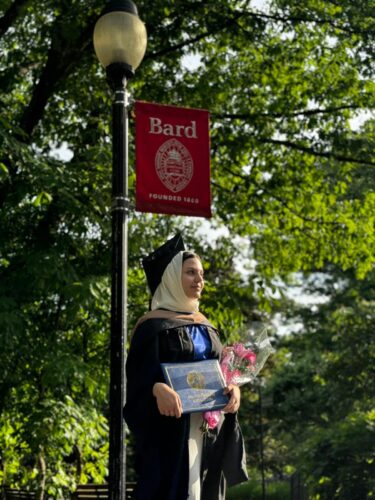Hope for Afghan women banned from education
For many refugee women, escaping war is only the beginning of their journey to freedom. Even after reaching safety, the struggle continues in many forms: isolation, financial hardship, cultural barriers and the emotional weight of starting life from nothing.
As a refugee woman myself, coming from a conflict zone, I have faced these barriers firsthand: limited resources, the difficulty of accessing education, and the challenge of securing scholarships in a completely new environment. Wanting to understand how other young Afghan women have overcome these obstacles and succeeded inspired me to listen to their stories.
I interviewed Amina, a 27-year old Afghan woman who fled her home country in 2021. Her story reflects the quiet strength and relentless resilience of countless women who have been uprooted by conflict
Before the fall of Kabul, Amina was in her final year of a Business Administration degree at the American University of Afghanistan. “Life was good,” she recalls. “I lived with my family, my siblings. We were happy.” She had big dreams for the future, not just for herself, but for her country.
When the Taliban returned to power, everything changed overnight. Amina first fled alone to Bishkek, Kyrgyzstan, before eventually resettling in the United States. Her journey was filled with obstacles. She arrived alone in California, with no financial support and no familiar faces around her. “I didn’t know anyone,” she says. “I didn’t even have money. There were so many days I felt like giving up.” At first, she was staying with a relative. After six months, she landed a job in retail, then rented a room with a roommate, living independently while also supporting her family back home.
“For many refugee women, escaping war is only the beginning of their journey to freedom.”
But she didn’t give up. She held on to one thing she still had: the hope of continuing her education. “I come from a country where women are banned from even going to school. And yet, here I was, still able to study. That privilege, and the sacrifices I’d already made, pushed me to keep going.” Those sacrifices included leaving her family behind, not being able to be with her family while she grieved the loss of her father, and starting everything from zero in a new country.
Today, Amina holds a master’s degree from Bard College in New York State, which she completed in May 2024.
“It was so hard. I fled two countries for this. I worked for it. I earned it. And I never gave up,” she says. For Amina, education is more than a degree. It is identity. It is power. “Wherever I am in life right now, it’s because of my education. I’m working. I can support myself. I have a better life. Every single dream I’ve achieved is because I had access to education.”
“I worked for it, I earned it. Every single dream I’ve achieved is because I had access to education”
Amina is no longer just a student. She is a provider. “The same girl they said would never provide for anyone is now the one sending support back home,” she says with pride. She has a good job now, working for the past year with a nonprofit organisation that helps refugees and migrants.
Her story resonates deeply with me. I also came to the United States as a refugee from Afghanistan. I started from zero, with no connections, limited resources, and countless barriers. I was accepted into 13 universities, but struggles, lack of guidance, and the challenges of navigating life as a newcomer stood in my way. Securing a scholarship, adapting to a new culture, and rebuilding my life felt overwhelming. Everything was different: the language, the people, the places, and being alone in a new country was unfamiliar. I felt like a stranger everywhere I went, surrounded by people yet feeling foreign and out of place. But, like Amina, I refused to give up. I know what it means to carry your home in your heart while building something new with your hands.
“I know what it means to carry your home in your heart while building something new with your hands”
Amina’s strength mirrors the quiet determination I see in so many women and in myself. When I ask her what message she would give to Afghan women who are banned from school or face overwhelming barriers, she says: “Never give up. Keep fighting. Keep believing. One day, you’ll get there. And when you do, you’ll be unstoppable.”
Her words echo in the hearts of millions of girls who still wait for a classroom, a book, or a voice. Through stories like hers, we are reminded that even in exile, hope can grow. From nothing, something unbreakable can rise.
For anonymity reasons, Amina is referred to by her first name only.
Afghan refugees and higher education
Afghan refugees face numerous barriers to education, including financial hardship and language and cultural differences. These challenges are even greater for women and girls, who often confront gender-based discrimination, early marriage and restricted mobility, all of which severely limit their opportunities for higher learning. This stark reality highlights the urgent need to support and expand educational access for Afghan refugee youth, especially young women striving to rebuild their lives through education.
